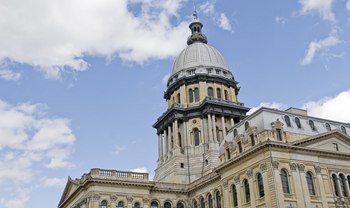
The Illinois Capitol
Juveniles who appeared before the Illinois Prisoner Review Board (IPRB) for parole revocation hearings were denied due process, according to a state-commissioned report that’s almost a year old. It hasn’t improved since then, says a Chicago attorney who’s filed a class action lawsuit on behalf of all youth who are heading toward the board.
The youths facing parole revocation hearings “don’t have an advocate, they don’t have the right to a public defender,” said Alexa Van Brunt, an attorney with the Roderick MacArthur Justice Center, part of the Bluhm Legal Clinic at Northwestern University School of Law. She filed the complaint this week on behalf of her client MH and all other similarly situated juveniles.
Young defendants like MH go before the IPRB, which is the same parole board that hears adults. The board held 1,132 juvenile parole revocation hearings in 2011, according to its annual report. Of those, 735, or 65 percent, of paroles were revoked.
MH has been in custody since Sept. 13, according to the complaint, but “he was never provided a preliminary hearing to determine whether there were reasonable grounds to believe he actually violated the conditions of his parole.”
Van Brunt argued that, in general, the IPRB hearing is “not a just proceeding.” And because the juveniles appearing before the parole board have no chance to confront adverse witnesses or bring evidence, it amounts to a kangaroo court, she alleges.
Van Brunt’s accusations mirror some of the findings of the Illinois Juvenile Justice Commission’s Youth Reentry Improvement Report from December 2011. That report advised courts take over juvenile parole revocation, finding that in IPRB’s hands, “revocation determinations are idiosyncratic, subjective, premised on a cursory review of documents, void of guidelines, and not reviewable.”
The Illinois legislature did not act on those recommendations, though one bill was filed which would have capped juvenile paroles at six months.
“There’s interest on the advocate side” for pushing parole revocation changes, said John Maki, executive director of the John Howard Association of Illinois, a prison reform group.
But major changes like those recommended in the 2011 report can take years, Maki pointed out.
Van Brunt said that depending on the state’s stance on her suit, the litigation could go on for years.
If those timelines hold up, that means hundreds, maybe thousands more youths will go before the IPRB.
The IPRB declined comment on the pending litigation.
Photo by Examiner.com
